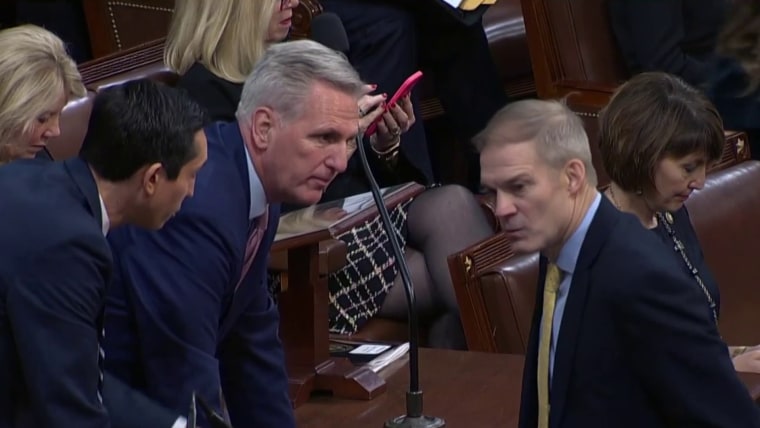As the first day of the new Congress approached, the most frequently referenced number on Capitol Hill was four. With a House Republican majority with 222 members, GOP Leader Kevin McCarthy and his allies realized he could lose no more than four of his own members if he was going to become speaker.
With this in mind, as 2022 came to an end, the party leadership had a problem: Five House Republicans — Arizona’s Andy Biggs, Florida’s Matt Gaetz, Virginia’s Bob Good, South Carolina’s Ralph Norman, and Montana’s Matthew Rosendale — said they’d oppose McCarthy’s bid, and they showed no signs of backing down. If members of this “Never Kevin” contingent stuck together, and they vowed to do exactly that, McCarthy would fall one vote short.
This week, the arithmetical problem intensified, as a group of nine conservative members released a written statement saying they’d heard the GOP leader’s latest pitch, and it wasn’t good enough for them. These nine skeptics were on top of the five aforementioned McCarthy opponents, bringing the new total to 14 — or 10 more than McCarthy could tolerate.
Yesterday, as members stopped talking and negotiating, and instead started voting, the tally proved to be even higher than many expected. Politico reported:
At the heart of Kevin McCarthy’s struggles for the speakership is a bloc of roughly two dozen conservative House Republicans opposed to his elevation. It’s a mix of veterans of the Tea Party class, newly elected members and perennial thorns in the side of leadership.
For those keeping score, here’s the full list, in alphabetical order:
- Andy Biggs of Arizona
- Dan Bishop of North Carolina
- Lauren Boebert of Colorado
- Josh Brecheen of Oklahoma
- Michael Cloud of Texas
- Andrew Clyde of Georgia
- Eli Crane of Arizona
- Byron Donalds of Florida
- Matt Gaetz of Florida
- Bob Good of Virginia
- Paul Gosar of Arizona
- Andy Harris of Maryland
- Anna Paulina Luna of Florida
- Mary Miller of Illinois
- Ralph Norman of South Carolina
- Andy Ogles of Tennessee
- Scott Perry of Pennsylvania
- Matt Rosendale of Montana
- Chip Roy of Texas
- Keith Self of Texas
If some of these names are unfamiliar, it’s because Brecheen, Crane, Ogles, Luna, and Self were only elected a couple of months ago and are incoming members. They haven’t yet been sworn in — that comes after the election of the speaker — but they’re able to vote anyway.
It’s also worth noting that Donalds is the only member of this group that actually supports McCarthy and voted for him on the first two ballots. On the third ballot, however, the Floridian, concluding that McCarthy simply lacked the backing he needs, abandoned the GOP leader. That said, Donalds told reporters last night that he’s prepared to switch back to supporting McCarthy if the Californian can reverse his fortunes.
Nevertheless, these members have quite a bit in common, including the fact that they’re nearly all election deniers, backed by Donald Trump, and affiliated with the right-wing Freedom Caucus.
As members prepare to vote again this afternoon, the question is relatively straightforward: Will McCarthy ever be able to convince 16 of these 20 Republicans to change their minds? If so, he’ll get the gavel he desperately craves. If not, the GOP leader will fail once again.

